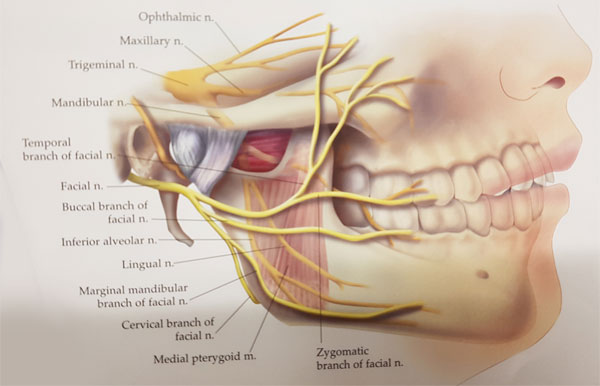Temporomandibular disorder (TMD) includes a group of musculoskeletal and neuromuscular conditions that involve the Temporomandibular joints (TMJ), the mastcatory muscles, and all the associated tissues, and they have been identified as a major cause of nondental pain in the orofacial region. Orofacial pain refers to pain associated with the hard and soft tissues of the head, face, and neck. These tissues send impulses through the trigeminal nerve (5th cranial nerve) to be interpreted as pain by the brain circuits. Evaluation and management of Orofacial pain requires collaboration among all field of medicine. Temporomandibular disorder (TMD) involve multiple stressors or contributing factors that increase the likelihood of developing and maintaining a chronic pathologic state that may lead to chronic pain.
What Causes This Syndrome?
- Whiplash injuries like in car accident can cause the muscle of the neck to be jarred and pulled violently, often resulting in ligament tears, stretching of hard and soft tissues to their limits and articular disc tearing.
- Clenching and Bruxism:
Clenching is the abnormal habit of keeping the teeth together during the day or night. Bruxism is the grinding of teeth usually during sleep. Both can increase the pressure on the Temporomandibular joints (TMJ) and may lead to muscle spasms. - Change to the bite due to loss of strategic back teeth which support to the muscles of mastication.
- Malocclusion or abnormal bite can lead to muscle spasms and TMD.
- Systemic diseases (osteo, rheumatoid and psoriatic arthritis, systemic lupus erythematosus, electrolyte imbalances) can produce jaw joints and muscle inflammation.
- Articular disc displacement. The jaw joint, in addition to being a ball and socket joint, glides forward and backward. When functioning correctly, the articular disc lies between the condyle head of the mandible and the roof of the joint. It normally follows the condylar head in its forward and backward movement.
If the ligaments that hold the disc to the condylar head are injured, the disc can slip out of place and can no longer serve as a normal cushion between the lower and upper parts of the jaw. Usually the disc is pulled forward. Mild displacements can cause a clicking or popping sound in the joint and can be sometimes painful. Permanent damage to the articular disc may result from abnormal displacements.
Symptoms of TMD
- Headache or elevator muscle pain.
- jaw joints discomfort or pain.
- clicking, popping or Crepitus (grinding sound) of the articular disc
- Tooth pain caused by excessive pressure and biting on teeth
- limited mouth opening or locking of the mouth
- Numbness or tingling of fingers
- Ear pain or ringing in ears
- Dizziness
- Neck, shoulder or back pain
- Pain behind eyes
Treatment
- Analgesics & Nonsteroidal anti-inflammatory drugs are effective for mild to moderate pain (ie Aspirin and Nurofen)
- Rest the affected area , eat only Soft food, avoid heavy mastication, gum chewing, wide yawning, singing and playing certain musical instruments , stop any habits like lips, cheek, nail or pen biting.
- Rest the lower jaw muscles by becoming aware of daytime clenching, keep tongue forward in the mouth, lips gently together and back teeth apart.
- Relaxation and stress management therapy.
- Physiotherapy: gentle movement exercises and massage the affected area can be effective in reducing pain, stiffness and increase muscle strength and mobility.
- Behavioural modification therapy can be helpful in identifying sources of stress and learning to relax the jaw & body muscles.
- Bite Adjustment to relieve excessive pressure on teeth
- dental implants to replace missing startegic teeth.
- Orthodontics and Dentofacial orthopaedics to align jaw bones/teeth, improve muscle functions and spread the load on the teeth.
- Occlusal splint also known as a bite plate sometimes may be useful to relief initial pain may be used as nightguard to protect teeth from night time grinding.
The Jaw
Normal Jaw Closed

Normal Jaw Open

Nerves of the Temporomandibular Region

